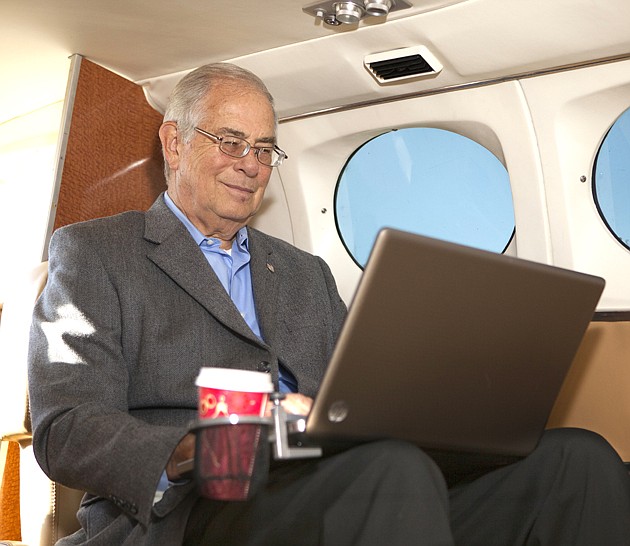- November 24, 2024
-
-
Loading

Loading

Sarasota engineer-turned-entrepreneur William Merritt, nearing his 80th birthday, is crystal clear about his endgame with the Laptop Butler, an invention that took eight years and at least $100,000 to bring to market.
Merritt's first goal is to quickly generate market validation for the product, a cup holder with a mesh pouch designed to protect laptop computers from spills. Then he wants out. He wants to sell it or license it to a bigger company, then pass the proceeds on to his children.
“A lot of people don't start a business when they are 78,” Merritt says, “but I got something I think will be a moneymaker for several years to come.”
The Laptop Butler clamps onto a laptop computer with a sturdy ring attached to the mesh pouch, so a drink stays steady while a laptop is on a user's lap. The ring and clamping mechanism are made of durable plastic, Merritt says, and the clamp is padded to prevent slippage or damage. The device, when not being used, folds up and fits into a computer bag.
The idea for the product stems from a problem Merritt's son-in-law, Jeffrey Taylor, had while he commuted on an Amtrak train from Philadelphia to New York City. Taylor would hold his computer on his lap and his coffee or hot tea between his feet on the floor — a precarious situation.
So Merritt decided to try to solve the issue. Says Merritt: “I'm the type of person that when I get involved in something, I can't rest until there's an answer.”
Merritt, who previously worked in combustion engineering for companies from Connecticut to Changwon, South Korea, went to work in his home garage. He experimented with Styrofoam cups of various sizes. He applied for a patent and was rejected six times over three years before he finally got one.
“It was something so simple, but there was absolutely nothing out there like this,” says Merritt. “I was bewildered that no one had come up with something like this.”
Merritt worked with Sarasota-based Delaney Manufacturing to build some prototypes. He then worked with a counselor from Manasota Score, a free business consulting service, to create a business plan.
That also helped Merritt pinpoint something that can often trip up a new inventor: price. For the Laptop Butler, Merritt settled on $24.99. It's currently available through a website Merritt set up, www.laptopbutler.com.
A U.S. Marine who served between the Korean and Vietnam wars, Merritt has higher hopes for the product beyond internal website sales. Going back to his main goal, he seeks broad market validation. A key step there is an ad in SkyMall, the in-flight magazine with a niche in quirky and unusual products. The ad, which he says will start to run in the second quarter, costs $15,000 an issue.
Merritt, so far, has only sold about 200 Laptop Butlers. So he recognizes an expense like that is bold move. That goes for the entire project, too. “I'm not a gambler, but this made enough sense to risk a lot of time and money,” Merritt says. “My hope is that sales will be so good we will have trouble keeping up with production.”
Inventor insight
William Merritt went from a career with major companies, including a subsidiary of defense contractor Raytheon, to being the entrepreneur-inventor behind the Laptop Butler. It's a cup holder with a mesh pouch designed to protect computers from spills. Here are a few lessons Merritt learned along the way: